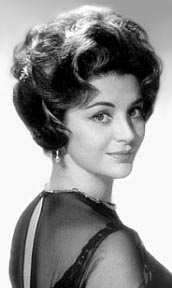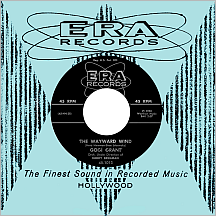GOGI GRANT
The Wayward Wind
What's in a name? For show business hopeful Myrtle Arinsberg it seemed like a good idea to come up with something more catchy than the one she was born with. At first she lacked confidence in her singing ability, putting any dreams of stardom on hold; born in Philadelphia, her family had moved to Los Angeles when she was 12. In 1952, divorced at 27 and raising a daughter, she took the plunge, trying her luck as Audrey Brown (using her middle and married names). Her manager, a fan and purported pal of Cary Grant, suggested Audrey Grant. RCA Victor signed the still-young chanteuse and label exec Dave Kapp made the final adjustment to her moniker. Russian-born entrepreneur George "Gogi" Tchitchinadze, with help from several celebrity investors, had purchased the former La Rue restaurant on Park Avenue in New York City a couple of years earlier, rechristening it "Gogi's La Rue." Seems it was one of Kapp's favorite dine-and-dance spots, a place where famous singers performed and the elite of Broadway, Hollywood and high society were often spotted. Audrey became Gogi Grant, to which she replied, "What is a Gogi?," a phrase that was then used as a slogan to introduce her to the world's music fans!
Her first single, "Where There's Smoke, There's Fire" with Glenn Miller's former saxophonist George Siravo and his orchestra, revealed Siravo's stuck-in-a-big-band mindset. One other release in 1952, "Mommy's Little Angel," matched her with instrumental group The Three Suns. Cover versions of "Ricochet" (a hit for Teresa Brewer in '53) and "Secret Love" (Doris Day in '54) were no go for Gogi. The situation improved in 1955 when she left RCA and signed with Era Records, started that year in Los Angeles by Herb Newman (who had briefly worked for another newly-formed label, Liberty).
"Suddenly There's a Valley," an inspirational (though not necessarily religious) song written by Biff Jones and Chuck Meyer, with a sensitive, near-perfect vocal performance by Gogi, was her first single for Era; it was a top ten hit in the fall of '55 and eventual million seller despite strong competition from versions by Julius LaRosa, Jo Stafford, The Mills Brothers and solo Andrews sis Patty Andrews. Her first album appeared with the too-obvious title Suddenly There's Gogi Grant. The follow-up in early '56, Paul Francis Webster and Jerry Livingston's "Who Are We," lacked the subtlety of its predecessor and had a brief, uneventful chart run. But the next recording shot Grant, and Era Records, over the plains and straight to the top.
"The Wayward Wind" had been written by Newman and Stan Lebowsky a decade earlier while the two were in college at UCLA; they submitted the song to "Tennessee" Ernie Ford (figuring he was a perfect match for lyrics like '...he was born the next of kin...'), but Capitol, the Ol' Pea-Picker's label, turned them down. So, as an afterthought in the final minutes of a studio session with Buddy Bregman conducting, they had Gogi give it a try. The simple arrangement received a burst of western-movie color when French horns, which figured softly into her "Valley" hit, were dubbed in later as a prominent component of the song. The record rode the charts for more than six months, April to November 1956, beating the odds when it displaced emerging phenomenon Elvis Presley's number one hit, "Heartbreak Hotel," off its two-month perch in the middle of June. The soon-to-be "Big E" supplanted her at the end of July with "I Want You, I Need You, I Love You," sandwiching Miss Grant's smash between his first two chart-toppers (The Platters, Guy Mitchell, Pat Boone and Sam Cooke would soon find themselves similarly flanked on either side by survey-hogging Presley hits). Apparently Capitol hadn't completely written the song off; a version by country singer Tex Ritter, suspiciously using a near-identical arrangement, made the top 40 during Grant's stay at the summit.
"You're in Love," from the low-budget film Accused of Murder, and its flip side, "When the Tide is High," were both written by Newman and Bregman and showed up separately on the low end of the charts just as "Wayward Wind" was winding up its amazing run. Afterwards, hits were hard to come by, though Gogi made a high-profile appearance on the Academy Awards broadcast in March '57, curiously performing Best Song nominee (and winner) "Whatever Will Be, Will Be" from Alfred Hitchcock's The Man Who Knew Too Much in place of the film's star, Doris Day, who'd sung the hit song in the film.

A May 1957 installment of CBS-TV's prestigious Playhouse 90 starred Polly Bergen in the critically-acclaimed The Helen Morgan Story (Bergen won an Emmy for her performance) and Hollywood scrambled to put out a big-budget theatrical version. Helen Morgan, the "torch singer" from Chicago best known for her starring role in the Broadway musical Show Boat in 1927 and her 1928 hits from the show, "Bill" and "Can't Help Lovin' Dat Man," had died in 1941 at the age of 41, leaving behind a public fascinated with her brief, bright career and untimely death from alcohol abuse. Warner Bros. hired Oscar-winning director Michael Curtiz to direct the musical starring Paul Newman and Ann Blyth as Helen in a strict adaptation of the TV drama. Gogi Grant was selected to perform all the songs, dubbing vocals for the lead actress, whose singing style was deemed too "operatic" for the voice of Morgan. Blythe was miffed, but what could she do? Spot-on, seamless lip-syncing, that's what!
The soundtrack album for The Helen Morgan Story, with Gogi on the cover (though she didn't appear in the film), was released on her former label, RCA Victor, and hit the album charts in early 1958. An acting opportunity arose and she was cast in The Big Beat, a full-color rock and roll flick featuring Fats Domino (he had a hit with the title tune), The Diamonds, The Dell-Vikings and non-rockers The Mills Brothers (who had, as noted before, previously crossed Grant's path). Not exactly wowing moviegoers with her thespian skills, there were no further feature film opportunities...but her acting career wasn't over just yet. She left Era and returned to RCA, cranking out several singles and several more albums during a two-year stretch, hitting the charts only once, with "Strange Are the Ways of Love" (a Dimitri Tiomkin-Ned Washington song from The Young Land starring Patrick Wayne and future Batgirl Yvonne Craig) in the summer of '58. The song was nominated for an Oscar and she performed it on the April '59 show (she made one more appearance at the Academy Awards in 1962, doing "Pocketful of Miracles," subbing for the original artist, Frank Sinatra).
Gogi left RCA for Liberty Records later in the year, but her recording career seemed to be in free-fall. She was granted another stab at acting with a role in an October 1960 episode of NBC's police drama Dan Raven (playing the title character Penny). One additional TV role, in the episodic CBS anthology series The Lloyd Bridges Show, was telecast in March of '63. In between, she kept plugging away at making records, scoring a surprise hit: "The Wayward Wind"! Era reissued the single in early 1961, labeling it as a "Special Original Demand Release," a ploy that worked; the dramatic, horn-drenched (and already dated-sounding) song returned to the charts for two months in the spring of '61. Then, Newman and Lebowsky's hit became a blockbuster once again when Frank Ifield took his version to number one in England in early 1963.
During the 1960s Gogi bounced from 20th Fox Records to small labels like C-R-C Charter and Records by Pete. Country songwriter Cindy Walker's "The Sea," recorded by Gogi for Monument, spent four months on Billboard's Easy Listening chart during the spring and summer of 1967, a welcome development, though it came a little late in the game. Soon afterwards, Gogi Grant made the difficult decision to retire from the music business. She had a new husband and a second child, a boy this time; the desire was strong to make this marriage work (ultimately it didn't). The urge to resume singing eventually took hold and after 20 years, in 1987, the 62-year-old resumed her career. Fans, both old and new, responded enthusiastically.


